I was gifted a collectors’ edition of Everdell for Christmas a few years back and it has remained a favourite and regular at the table ever since.
I have a soft spot for games involving woodland animals (Root is another favourite of mine), but Everdell is also a fantastic worker placement that plays smoothly and has lots of replayability thanks to its wide range of cards, each with its own powers.
Everdell: What You Need to Know
- Number of players: 1-4
- Time to play: 40-80 minutes
- Age of players: 13+
- Designer: James A. Wilson
- Publisher: Starling Games
Everdell combines tableau building with worker placement as you build up your city of adorable woodland animals. Everdell is slick, fun, fairly easy to learn, and, perhaps most importantly, has some of my favourite and cutest art out there.
Andrew Bosley, Cody Jones, and Dann May’s art captures the life of anthropomorphic woodland animals, from majestic royal mice to bardic songbirds. Despite being a board game with no story, as such, there is a rich world to Everdell that elevates the gameplay as a whole.
A Guide to Playing Everdell
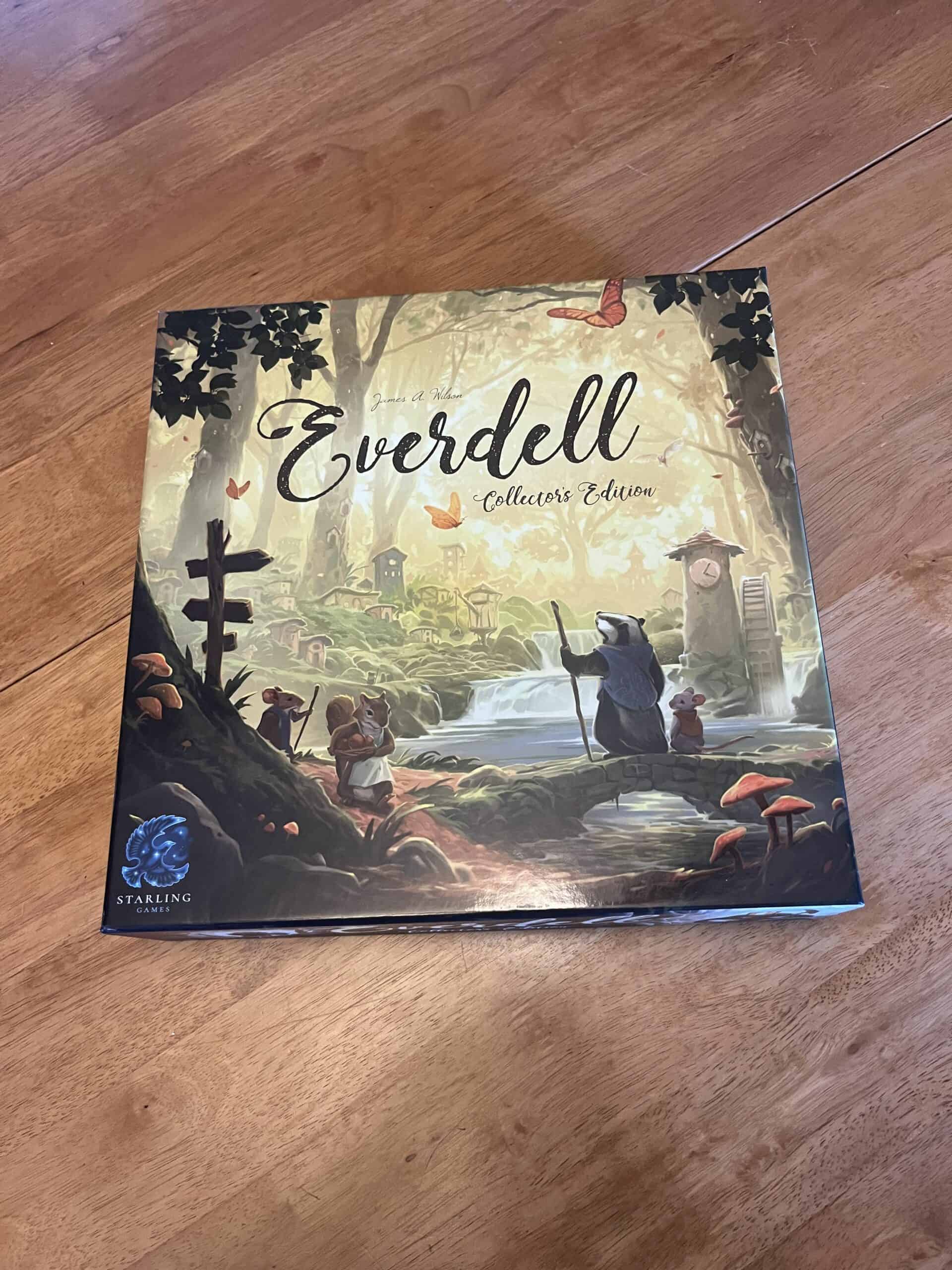
What’s in the Box?
- Game Board: This board depicts the valley of Everdell and has spaces for Forest cards, Event Tiles, resources, and Forest cards.
- Ever Tree: A 3D cardboard tree that stands on the game board. It holds the Event cards, the Everdell deck, and extra workers that players will acquire throughout the game.
- Cards:
- 128 Critter and Construction cards (Everdell deck)
- 11 Forest cards
- 16 Special Event cards
- 1 Victory card
- Resources: 30 berries, 30 twigs, 25 resin, and 20 pebbles
- 24 Occupied Tokens
- 30 point tokens
- 24 Workers (6 wooden animal tokens per player)
- 4 Basic Event Tokens
- 8-sided die: Used in solo play.
- Rulebook: A comprehensive guide to set up and play the game.
Set Up
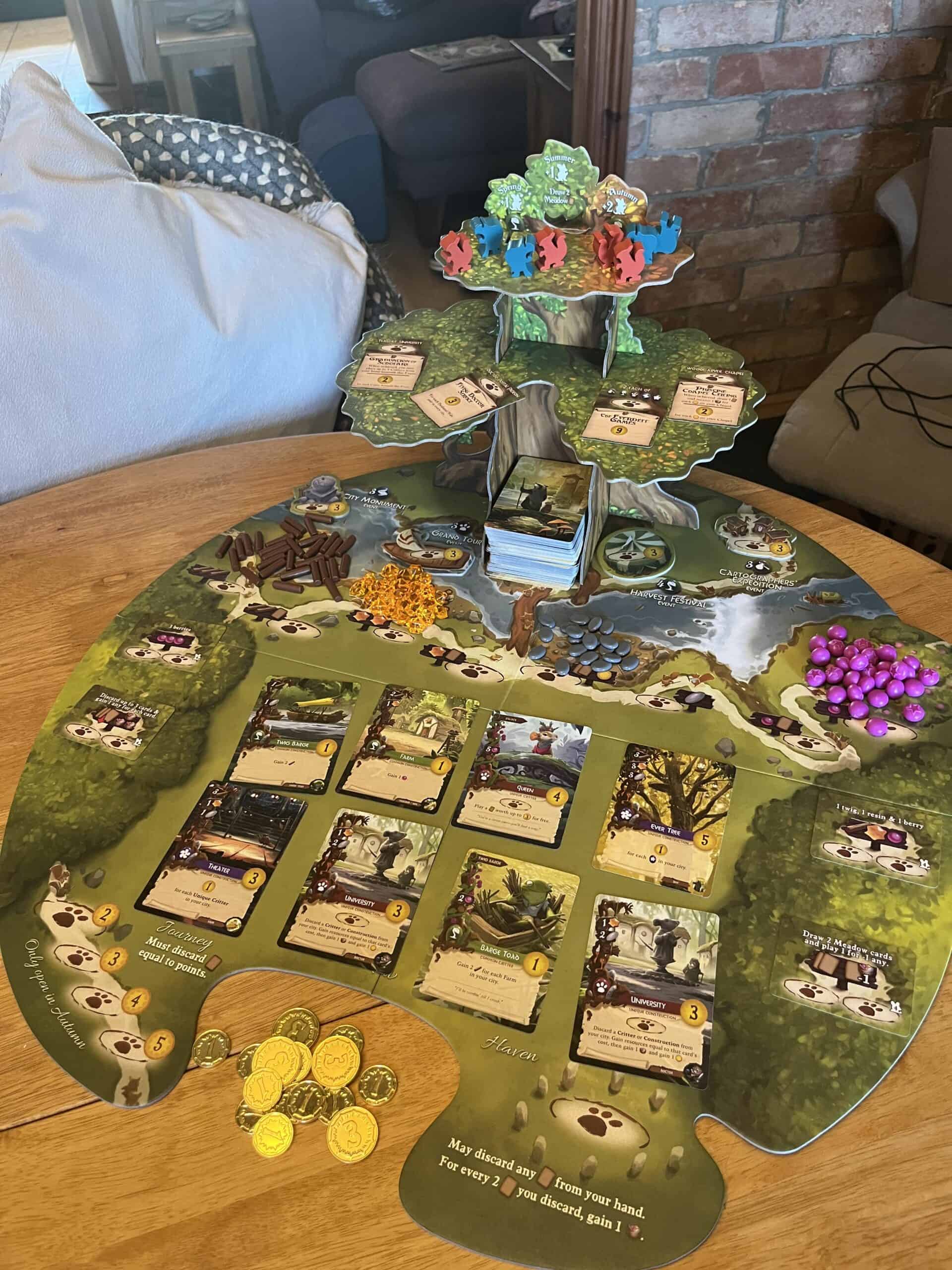
- Game Board: Place the Everdell game board in the middle of the table and build the Ever Tree and place it at the top of the board.
- Resources: Place all the resources (Twigs, Resin, Pebbles, and Berries) in their respective locations on the board.
- Cards: Shuffle the Forest cards and place them face-up in the Forest spaces — 3 for a 2-player game or 4 for a 3 or 4-player game. Shuffle the main deck (the ‘Everdell’ deck) and deal 8 cards face-up into the Meadow (a shared area of the board). Then, the first player is dealt 5 cards, the second 6, the third 7, and the fourth 8. Place the rest of the deck inside the Ever Tree trunk.
- Workers: Each player gets two workers and places the rest on top of the Ever Tree to collect in later seasons.
- Events: Place the four Basic Event tiles and the Special Event cards on their respective spots on the board.
How to Win Everdell
In Everdell, the player who earns the most points by the end of the game wins. Points are mostly gained from cards in your city, but can also be earned by achieving event cards or by sending workers on a journey where you exchange cards for points.
Gameplay
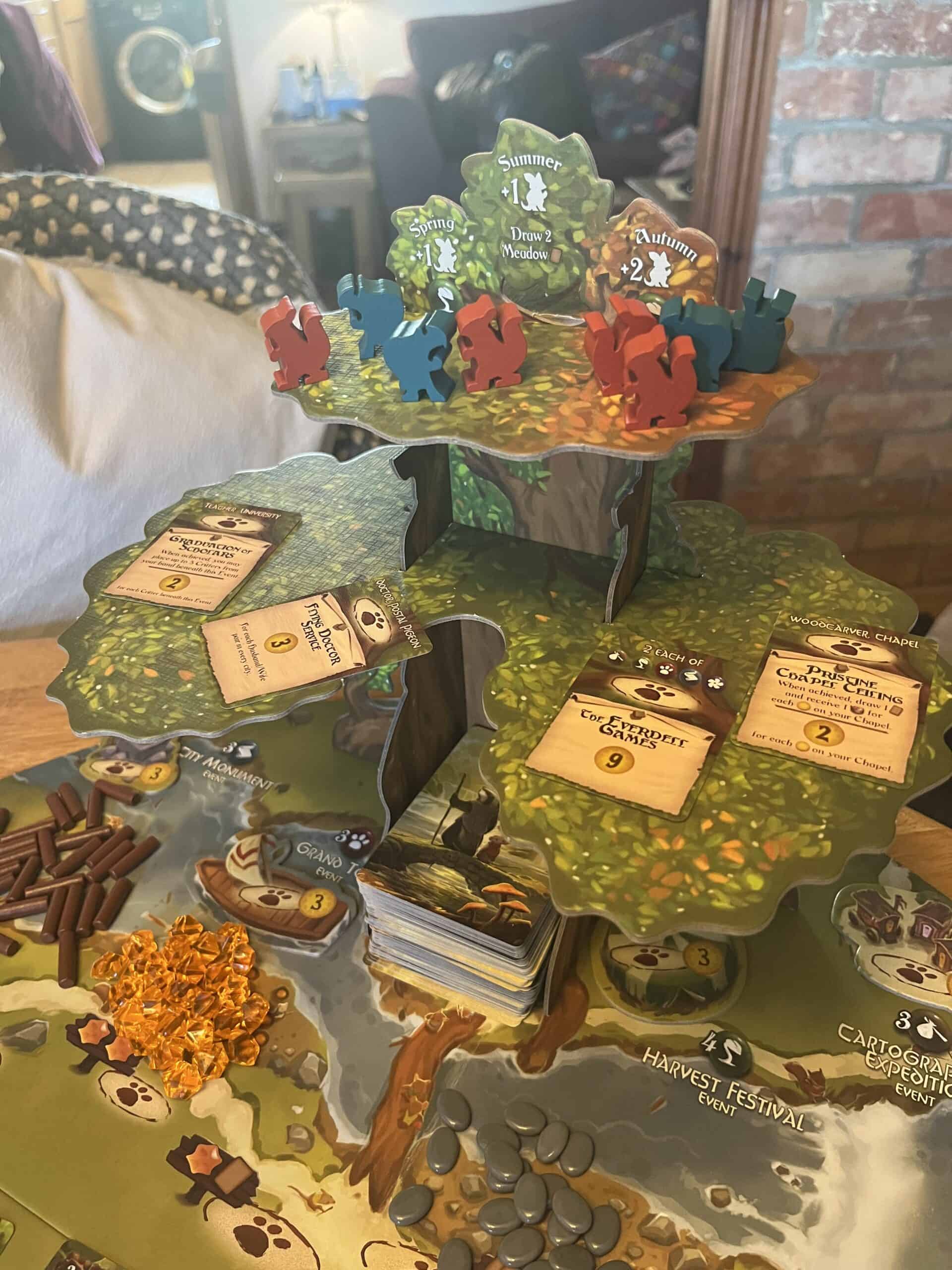
Players start the game with five Everdell cards and a number of workers depending on how many players there are — 2 workers in a 4-player game, 3 workers in a 3-player game, and 4 workers in a 2-player game. You’ll get the rest of your workers during the course of the game.
Once you’ve set up the board (mostly just placing resources and tokens in their labelled spots and shuffling the Everdell deck), players take turns doing one of two actions:
- Place a worker: The player places a worker on an available spot and collects the resources or takes the action indicated on the board. Some worker spots on the game board have an “Occupied” sign, meaning only one worker can be there per season.
- Play a card to your city: The player plays a card from their hand or the Meadow into their personal tableau (city), paying its cost in resources. Cards can be either Critters (characters) or Constructions. Each city can have up to 15 cards. Critters can also be played for free if the player has the corresponding Construction in their city.
The game progresses through four seasons: Spring, Summer, Autumn, and Winter. When a player has placed all their workers, they may choose to prepare for the next season, which involves:
- Spring: Retrieve your workers from the game board and gain one additional worker.
- Summer: Retrieve your workers and gain one more, and also draw two cards.
- Autumn: Retrieve your workers and gain your final worker. Now you can also activate the Green Production symbols on the cards in your city.
Players can achieve Basic and Special Event objectives to gain more points. Once achieved, they place a worker on the Event, claiming it.
The game ends after all players have passed in the Winter season. Scoring is based on:
- Point values on cards in the player’s city.
- Achieved events.
- Any bonus points from cards in your city.
And you guessed it — the player with the highest score wins the game.
Strategies
Everdell is, to a degree, about luck of the draw and it’s not always possible to strategize as every game is different. That said, there are some useful cards and combos to look out for and play in your city.
- Play a Farm early: The Farm card helps you get berries (essential for buying critters) and works well with a number of other cards, especially the Husband and Wife.
- Stock up on pebbles: The hardest resource to get but essential for many constructions.
- Get free critters with constructions: Every critter has an associated construction that lets you play that critter for free if the construction is in your city, so make the most of this.
- Play a Crane for construction discounts: If you have the opportunity to place a crane in your city early in the game, do it!
- Look for synergies: Loads of cards in Everdell complement each other and winning this game often comes down to building a great engine in your city where cards benefit each other as you play.
Everdell: My Review
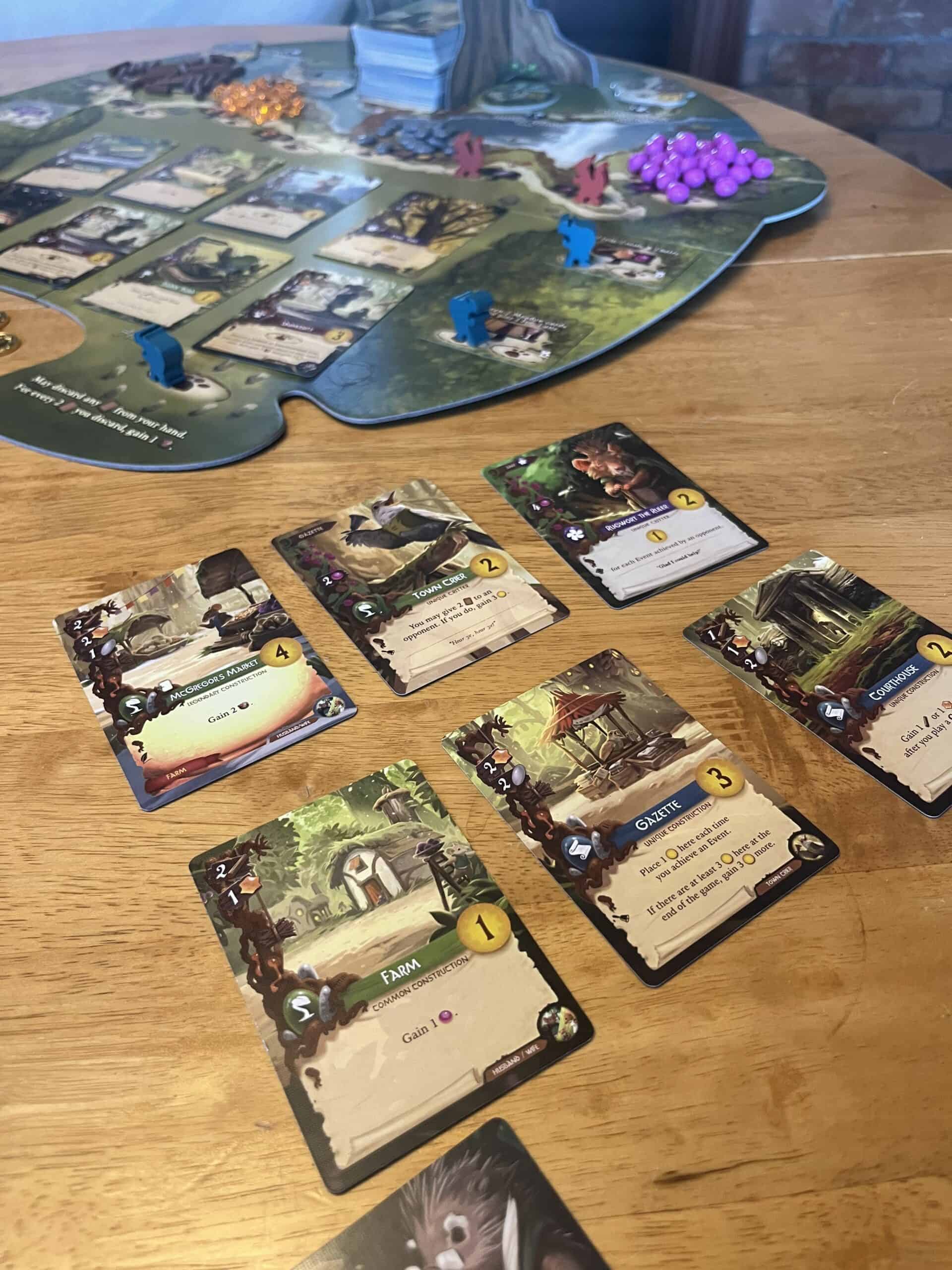
- Overall gameplay: 8/10
- Replayability: 7/10
- Artwork and components: 10/10
Pros
- Beautiful artwork and high-quality component
- Easy to learn yet strategic
- Well-balanced gameplay
Cons
- Minimal player interaction
- Luck of the draw
- Large board and playing area
Let’s start with mechanics and gameplay. Everdell is, in many ways, a classic board game that combines two mechanics familiar to many gamers: worker placement and tableau building, with a little bit of hand management. This is all slick and can often be as complex as players wish to make it — it’s easy to simply play cards and have fun without worrying too much about strategy.
That said, there are plenty of ways to strategize based on the cards you’re given. You can focus on creating a strong engine in your city (usually the best way to win) or focus on achieving special events or building high-value purple constructions. Since it comes down to the cards that appear, your strategy will often change from game to game. Plus, the wide range of cards and potential combos mean Everdell has pretty good replayability and doesn’t get stale quickly.
Since the game often comes down to cards drawn, some players might be frustrated at the luck of the draw aspect of Everdell. You can strategize all you like, but sometimes the cards dealt to you make it harder to win while opponents get exactly what they need. Everdell certainly isn’t the only game with this as a potential issue and I’ve not experienced any especially unfair games take place due to bad cards, but it can cause some frustration.
Another potential con for some gamers is the lack of player interaction. While players, especially in a 3 or 4-person game, can block each other’s actions on the board, this doesn’t play a big part in-game strategy. Players looking for highly interactive games won’t be as satisfied with Everdell, in which players are generally working towards their goals alone with no engagement between players.
Yet where Everdell really excels is in its artwork and components. The character art for the critters is so rich and every card tells a story. This gives the game a rich, thematic world that if you’re a lover of nature-themed, woodland animal board games, you’ll be instantly won over. The quality of components is also high, regardless of which edition you have. My collectors’ edition has fantastic squishy berries and shiny resin (I often joke about how edible game pieces look as a marker of a game’s quality).

The excellent components and artwork of the game, including the 3D Ever Tree, lead me to one more criticism that might put gamers off. Everdell has a big board and requires an even bigger play area so that players can build up their cities. If you have a small gaming space, you might struggle to enjoy Everdell as you wrangle with cards and a large board.
The frustrations some players may have with Everdell are not, however, ones that I or my fellow gamers have experienced en masse. While we’re certainly blessed with large tables for gaming and don’t get too upset if unlucky card draws mess up our strategies, we’ve also been collectively won over by the cute world and fantastic art of Everdell, along with its well-balanced gameplay that feels light yet thoughtful.
Everdell Expansions: A Mini Guide
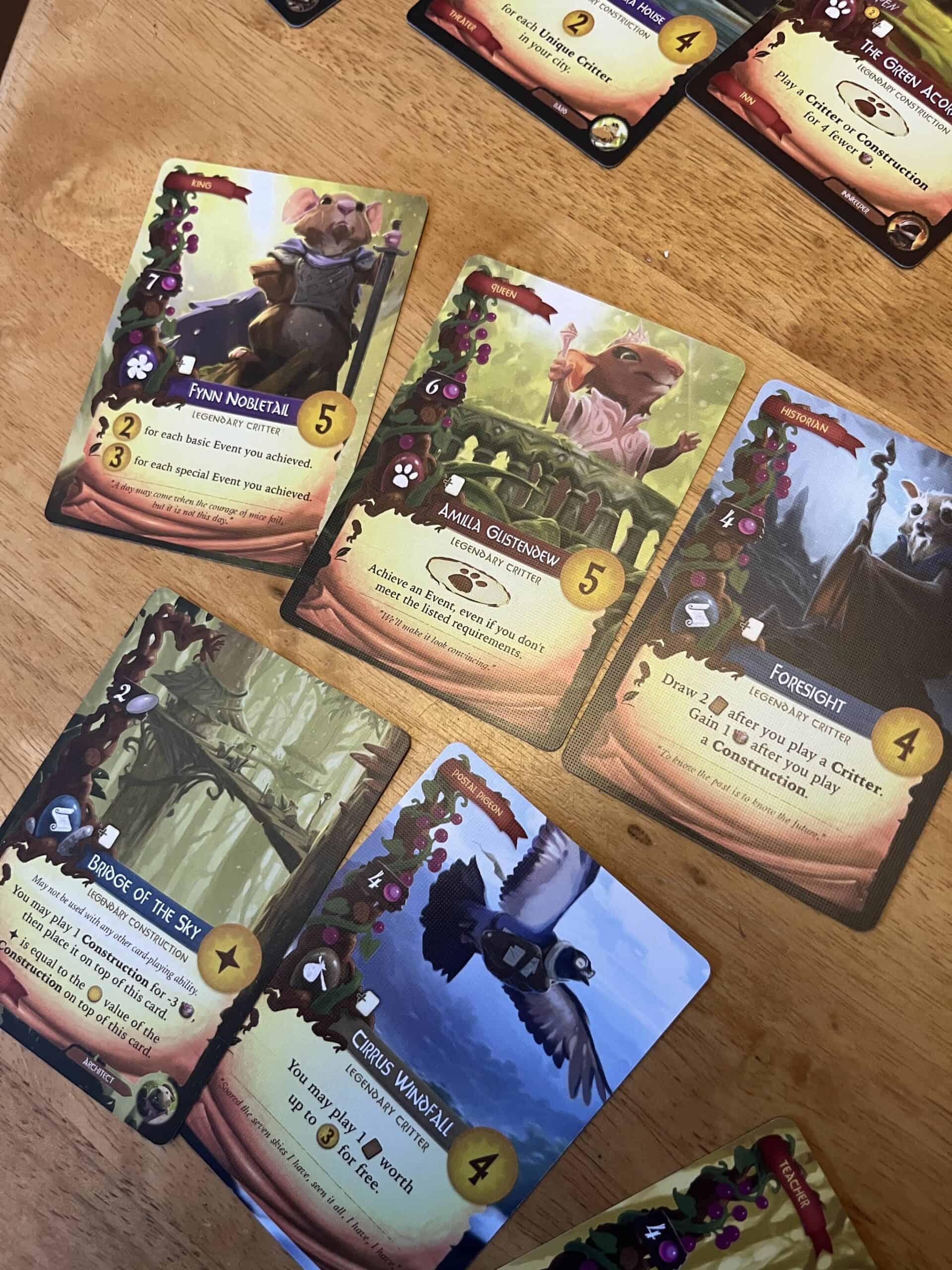
Everdell is popular and beloved (not least by me), so plenty of expansions have hit the market. Each expansion is doing something quite different, so it’s difficult to rank them. Instead, here’s a mini guide with a general score out of ten from me.
- Spirecrest: My personal favourite Everdell expansion, Spirecrest, lets you send a worker on a journey up a mountain (a new board). The theme works perfectly with the rest of the game and allows for new, fun strategizing. 8/10
- Mistwood: Essentially the solo player expansion of Everdell, Mistwood adds a new character, the Nightweave, and a deck of Night cards. Also offers more of a ‘story’ than the base game, which is great for solo gaming. 6/10
- Legends: I have these ‘legendary’ cards in my collectors’ edition and they certainly add a lot to the overall theme and lore of the game. That said, I could easily imagine playing without them. 5/10
- Extra! Extra!: Like Legends, Extra! Extra! is a small pack of additional cards rather than a full-on expansion. Lots of fun cards in here but I actively avoid anything to do with Scurrble, the Everdell sport of choice…maybe because I’m not into sports myself. 6/10
- Newleaf: This expansion doesn’t change much about the gameplay, but it does add some fantastic new cards (trains have arrived in Everdell!). It certainly adds a lot of fun to Everdell and who doesn’t love new content? 9/10
- Bellfaire: The main attraction of Bellfaire is that it allows for 5-6 players and is certainly a great expansion if you are fed up with Everdell’s base game. Bellfaire’s addition of player powers, the new market board, and Garland Awards (a race to complete certain achievements first) can make Everdell very different to play, plus you can pick and choose which additions to include in your game. 7/10
- Pearlbrook: Pearlbrook introduces an underwater realm to the world of Everdell, adding a new board (the River), resource (pearls), card types (adornments and wonders), and critter (frog ambassadors). The major strategy addition is the decision of when to send your frog ambassador underwater to collect pearls and build wonders, which can earn you a ton of points. It’s spot on for the theme, but this expansion can completely take over the game so we don’t use it often. 5/10
More Games Like Everdell
So you know and love Everdell and are looking for something similar? Chances are, your love for Everdell is due to the art and theme rather than the gameplay, which is pretty standard worker placement and tableau-building stuff. So games like Everdell are chosen based more on theme and art, with a couple based on similar mechanics.
Root
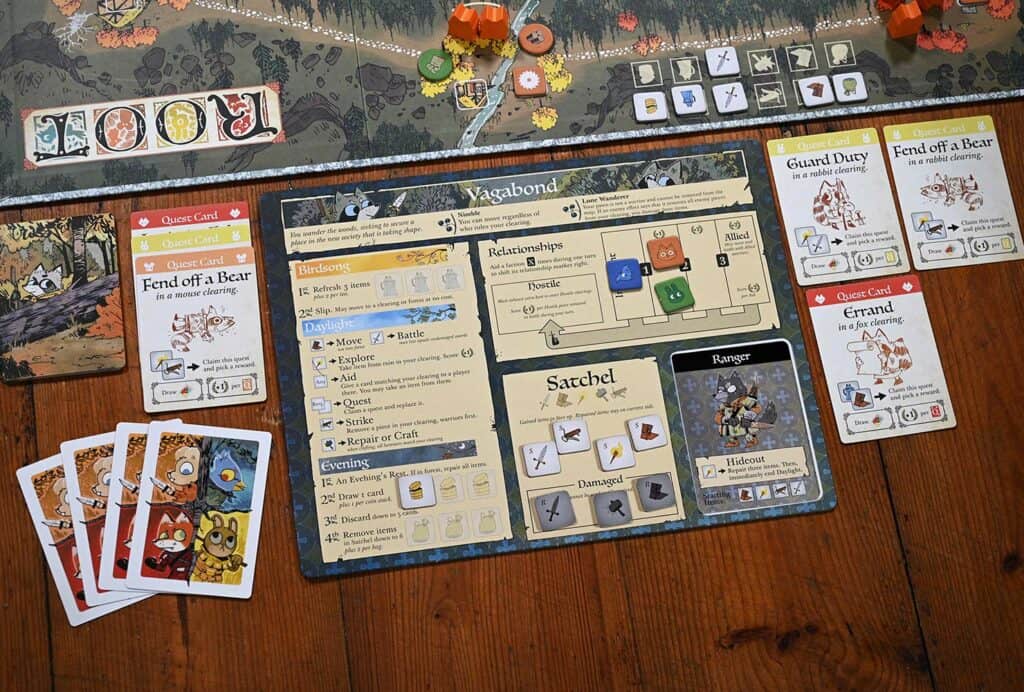
Number of players: 2-4
Time to play: 60-90 minutes
Age of players: 10+
Designer: Cole Wehrle
Publisher: Leder Games
The gameplay may be almost entirely different, but if, like me, your love of Everdell stems from its cute character cards and rich world-building, Root is the perfect game for you. You play as woodland factions and play are asynchronous — that is, the character you play as gives you a completely different set of rules. You might be the capitalistic cats building industrial sites, the aristocratic and honour-bound birds, the rebellious woodland alliance, or the lone badger.
Like Everdell, the art (by Kyle Ferrin) is incredibly rich and adorable. The worldbuilding in this game is so strong, Magpie Games have even released Root: The Roleplaying Game.
Tiny Towns
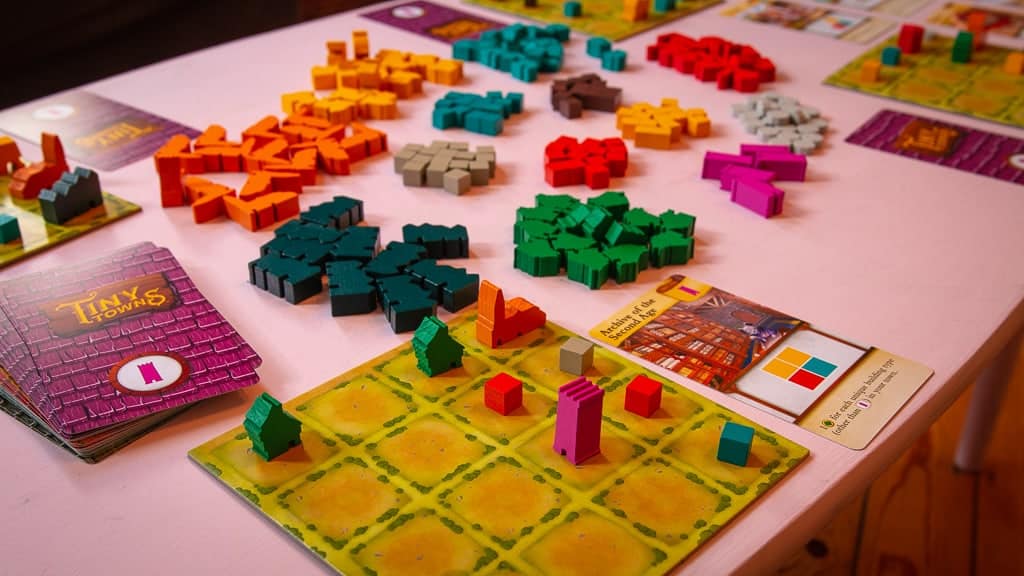
Number of players: 1-6
Time to play: 45-60 minutes
Age of players: 14+
Designer: Peter McPherson
Publisher: Alderac Entertainment Group
Tiny Towns is probably the most similar to Everdell since it also involves building a city and involves plenty of resource management and a bit of hand management too. Where Tiny Towns differs is that it has a follow mechanic, that is, when a player chooses a resource to place on their board, everyone else does too. Players need to match up resources in certain patterns that match the building cards. Building cards have additional requirements and some have extra powers too.
Tiny Towns is simpler than Everdell in many ways and isn’t as rich on theme, but it’s more interactive between players and the spatial interaction between buildings makes this game almost abstract strategy-like, but with a bit more theme.
Ark Nova
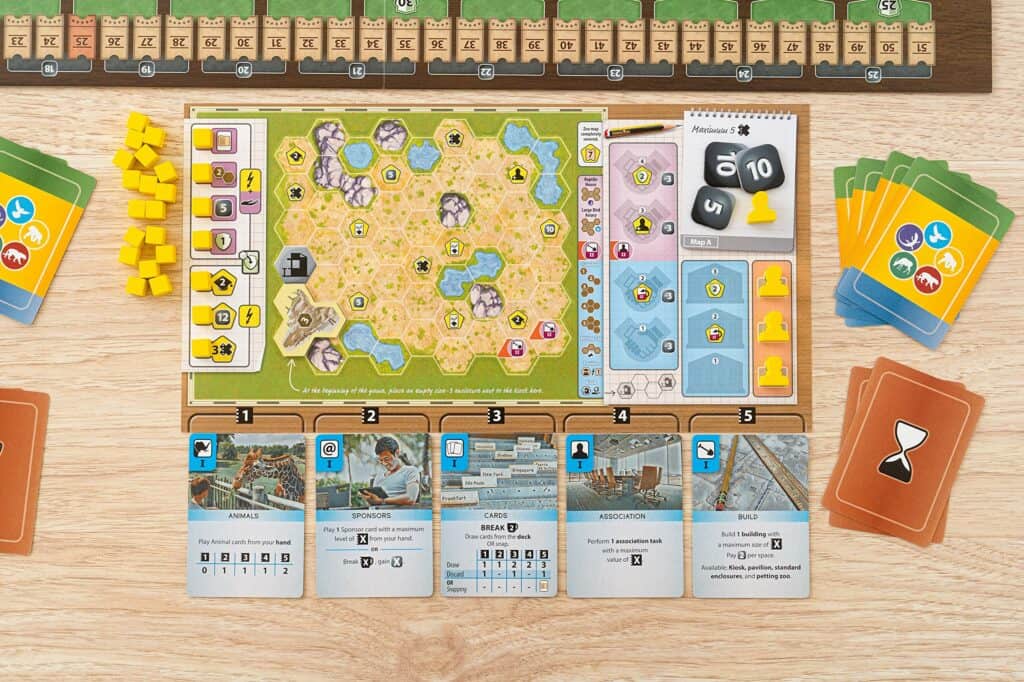
Number of players: 1-4
Time to play: 90-150 minutes
Age of players: 14+
Designer: Mathias Wigge
Publisher: Feuerland Spiele
One of the more difficult games on this list, Ark Nova will satisfy animal lovers as you’re managing a zoo, building enclosures and adding animals as you go.
The blending of tile placement, hand management, and a bit of income generation means Ark Nova certainly has some mechanics in common with Everdell, but it’s still very much a different game.
You’ll have to manage a lot of moving parts in Ark Nova, but if you can get your zoo engine up and running effectively, this board game is super satisfying to play. The wide range of tactics and cards means that Ark Nova is also very replayable.
Wingspan
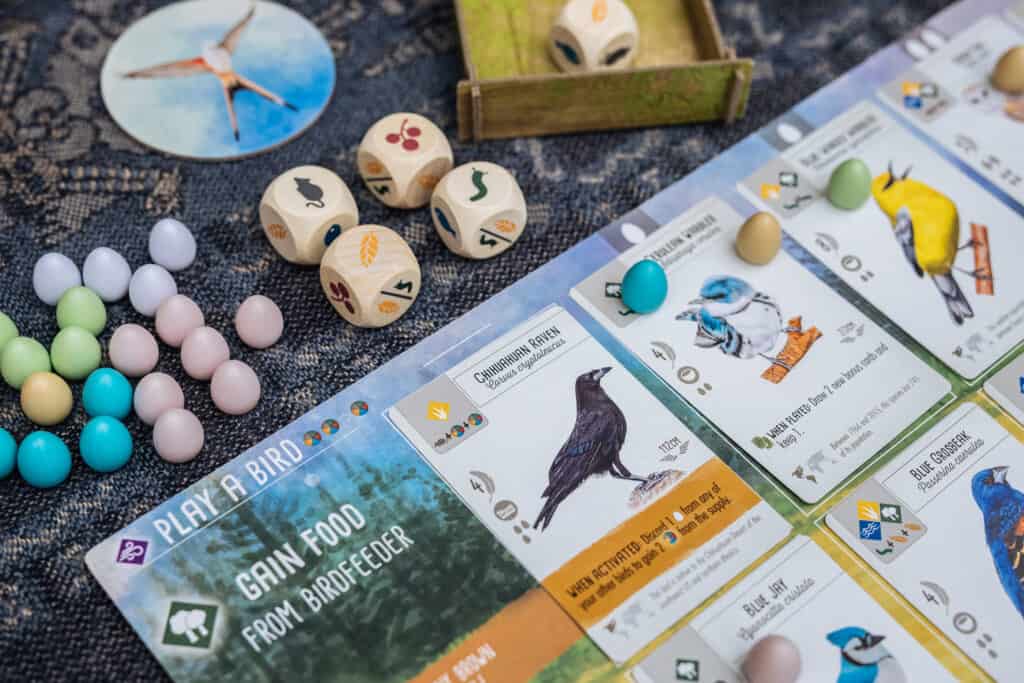
Number of players: 1-5
Time to play: 40-70 minutes
Age of players: 10+
Designer: Elizabeth Hargrave
Publisher: Stonemaier Games
Another game for animal lovers, rather than building a city like in Everdell, in Wingspan you are building a network of birds, which essentially act as an engine to gather resources and score victory points.
Wingspan has gorgeous art by Beth Sobel, Natalia Rojas, and Ana Maria Martinez, and perfectly edible-looking eggs too (I often compare them to Cadbury Mini Eggs). Gameplay is slick and smooth and the theme and mechanics go hand in hand. Players who love Wingspan often appreciate its wholesome theme and relaxing play style and the lack of interactivity can be seen as a pro or a con depending on how competitive you are.
The Isle of Cats
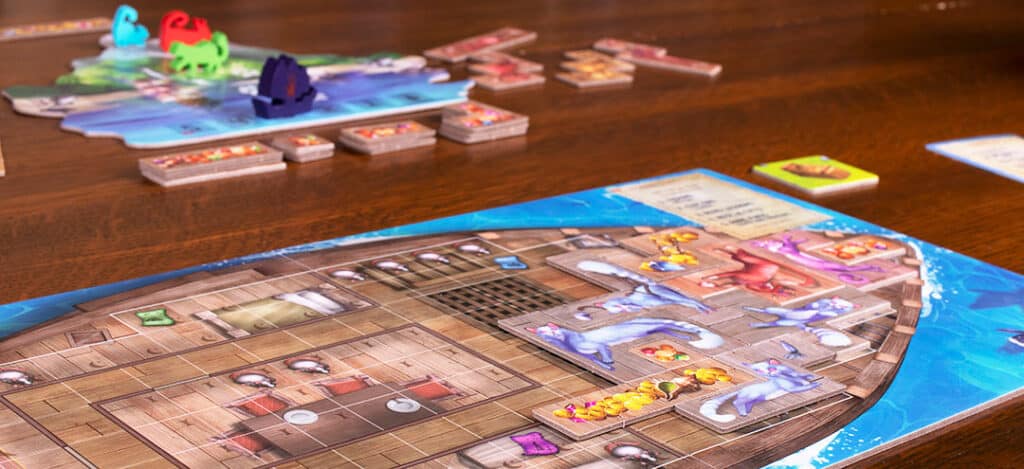
Number of players: 1-7
Time to play: 60-90 minutes
Age of players: 8+
Designer: Frank West
Publisher: The City of Games
While sharing very little in common with Everdell in terms of mechanics, The Isle of Cats is another cute and wholesome game with an emphasis on collecting animal characters as players work to rescue cats from an island about to be destroyed.
The Isle of Cats combines a few different mechanics. Card drafting is used to explore the island and find cats. Fish tiles are used to add cat cards from your hand and boots and baskets on the cards help you catch and carry cats. You then use different-shaped cat tiles to fill up your boat, so a bit of grid covering is required.
The Isle of Cats is very thematic and super wholesome, both qualities it shares with Everdell. With an age rating of 8+, The Isle of Cats is also the most family-friendly game on this list, so it’s perfect if you’d like an alternative to Everdell to play with your kids.
Conclusion: Should you buy Everdell?
Yes! There are very few gamers I’ve met who don’t enjoy Everdell as a light, wholesome, and slick board game. It’s great for families, newbie gamers, and experienced board game groups alike.
As I’ve said, the main attraction of Everdell is the adorable art and great components, so if the visual elements of games and the overall theme aren’t as important to you, you won’t get as much out of this game as I do. That said, I’ve yet to see a gamer’s heart not melt at this sweet game.
Frequently Asked Questions
Question: Is Everdell good for 2 players?
Answer: Yes! Everdell works very well with 2 players (it’s how I often end up playing it). There isn’t quite as much blocking of actions as there would be in a 3-4 player game, but this doesn’t affect the overall fun of the game.
Question: What age is Everdell for?
Answer: Everdell is recommended for gamers aged 13 and above. That said, kids from 10 and up may be able to play this with help from adults.
Question: Can you play Everdell alone?
Answer: Yes! Everdell‘s base game comes with a solo option in which you are pitted against Rugwort and his rats. The game runs similarly to a 2-player game but with a die used for determining how Rugwort will build his city. You can also pick up a copy of the expansion Mistfall for more solo-play options.
Continue reading:
Ten of the Best Mystery Board Games for when you want to tease your Brain and your Friends!
- Everdell Board Game Guide and Review - August 30, 2023
- Root Board Game Guide and Review - August 17, 2023
- Gloomhaven Board Game Guide and Review - August 16, 2023

